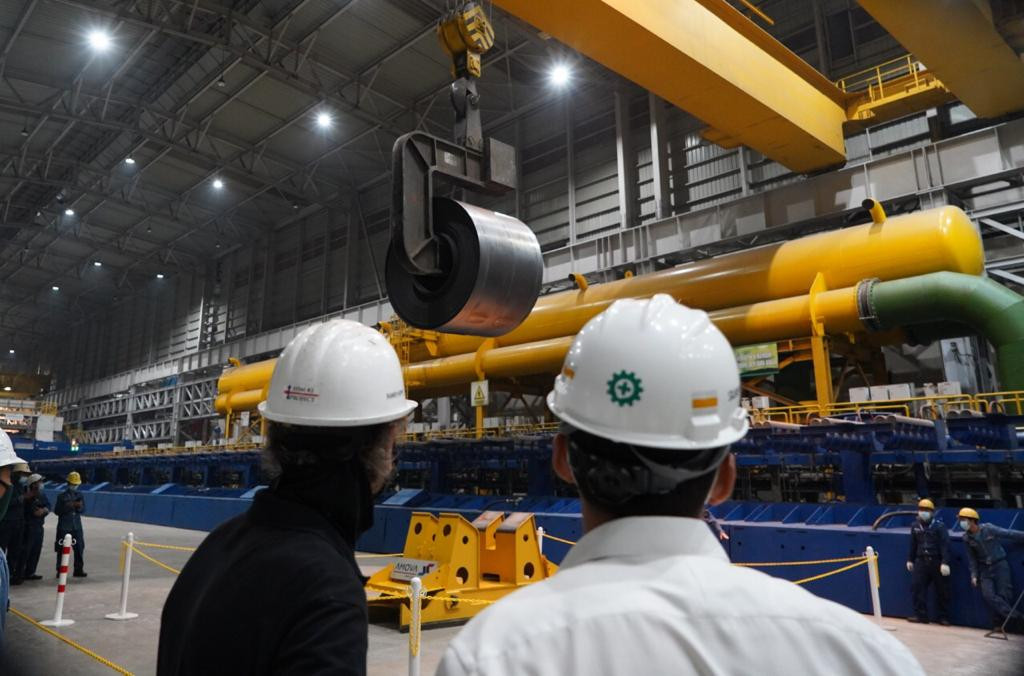Popular Reads
Top Results
Can't find what you're looking for?
View all search resultsPopular Reads
Top Results
Can't find what you're looking for?
View all search resultsRI factories struggle with high energy, materials prices
Factories across the country are going through a tumultuous time as high energy costs force them to pass some of the pain through to their customers.
Change text size
Gift Premium Articles
to Anyone
H
igh global energy prices are placing a burden on factories across Indonesia. Some are passing the higher input costs on to their customers, while others are resorting to coal as a cheaper alternative to oil.
Indonesian Chamber of Commerce and Industry (Kadin) deputy chair for industry Bobby Gafur Umar said the war in Ukraine had caused an “inevitable” increase in production costs, even if businesses implemented efficiency measures in their operations.
Inflation remained manageable in the past months, as many goods made in that time were produced with inputs brought into the country earlier, but Bobby warned that goods produced going forward would be more vulnerable to imported inflation as stocks of materials and semifinished goods needed to be replenished.
“The concern is that the government's projections for year-end economic growth will not come true. There are many reasons for this, one being that many expansion plans are currently on hold,” Bobby told The Jakarta Post on Wednesday.
To alleviate the significant strain that the higher-than-anticipated rise in oil prices is putting on the state budget, authorities hiked the prices of government-subsidized and some unsubsidized types of gasoline by about 30 percent earlier this month.
A decision by Group of Seven countries to limit imports and impose a price cap on Russian oil, and Russia’s subsequent suspension of gas deliveries through the Nord Stream 1 pipeline, have sent tremors across energy markets.
Read also: Pertamina in talks with Russia on oil imports
According to World Bank data, global average oil prices in August were about 39 percent higher than a year earlier at US$96 per barrel (bbl), while European natural gas prices had more than tripled at $70 per million British thermal units (mmbtu).
“Just yesterday, we had a discussion with the Industry Ministry, and the numbers are still being calculated [...], but for that [fuel price hike], some [industries] will see costs increase by 5 to 10 percent,” Bobby continued.
Energy-intensive industries and those utilizing imported raw materials in their production would be severely affected by high global energy prices, he explained.
Aside from transportation, electricity had also become more expensive as the majority of businesses in industrial zones utilized their own power generators that used coal or natural gas, Bobby continued.
Companies consuming raw materials for their production, such as coking coal in steel production, had an additional burden to bear amid the energy price increase.
The benchmark coal price (HBA) for Indonesia reached $323.9 per ton in June, the highest level ever since the government started keeping track of the HBA in 2009, while the government is considering to raise its benchmark gas price (HGBT) by $1 to $7 per mmbtu.
“Steel companies also consume a lot of energy, and although some of them have moved near ports, some still remain in Bekasi, and thus are affected by rising transportation costs,” Bobby added.
He urged the authorities not to raise interest rates to a level businesses could not handle, while ensuring stable electricity and natural gas prices for industrial consumers.
Read also: Logistics costs stung by fuel price hike, shortages
State-owned cement producer PT Semen Indonesia corporate secretary Vita Mahreyni said the company’s cost of revenue had been heavily affected by the rise in coal prices, as coal and other energy sources accounted for 30 percent of production expenses.
To mitigate the impact of high coal prices, Semen Indonesia was looking to increase the share of green energy and switch to low-calorie coal as well as fuel from waste, Vita told the Post on Friday.
PT Krakatau Steel president director Silmy Karim said the state-owned steelmaker could still adjust to global energy prices but urged that electricity prices for industries remain unchanged.
“Krakatau Steel optimizes [cost management] by using the most efficient operating patterns and operating only profitable facilities," Silmy told the Post on Wednesday.
Meanwhile, PT Aneka Gas Industri president director Rachmat Harsono stated that the gas distributor relied heavily on grid power and, therefore, would be forced to pass some of the extra costs on to customers should electricity prices increase.
“The increase in energy prices is inevitable. We could have become independent by building oil and gas processing facilities many years ago. Is it too late to build them now? It depends on how serious our government is about switching from conventional to renewables,” Rachmat told the Post on Thursday.
Nickel matte producer PT Vale Indonesia is also looking to energy input substitution in response to high oil prices. Vale finance director Bernardus Irmanto said that while high energy prices definitely added pressure on production costs, the company could mitigate the impact by operating a dual burner dryer that could use either oil or coal.
Adding that Vale operated three hydropower plants generating 265 megawatts of electricity, and given the current high price of nickel, he expressed confidence that margins would remain positive.
“We hope that all of these measures can partially compensate for the impact of rising [energy] prices,” Bernardus told the Post on Wednesday.
Read also: Coal not ‘dead’ as prices remain high, IPOs still appear lucrative
State-owned Bank Mandiri energy expert Ahmad Zuhdi Dwi Kusuma noted that inflation would increase if industries passed the rising costs through to consumers, but if firms bore the costs themselves, that would impact their financial performance.
“The increase in fuel prices has more of an impact on industries with high logistics costs. According to our data, the transportation equipment industry, metal goods and several other industries that require high transportation mobility will be greatly affected,” Ahmad told the Post on Wednesday.










